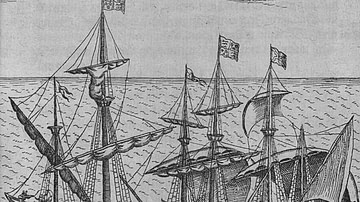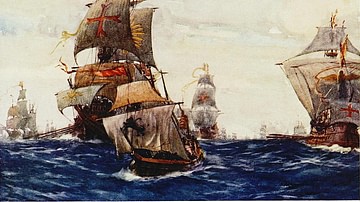Search
Search Results

Definition
War of Jenkins' Ear - How One Man's Ear Started a Colonial War Between Empires
The War of Jenkins' Ear (1739-1748) was a colonial conflict fought between Great Britain and Spain, primarily in the Caribbean and off the coast of South America. Looking to protect its interests in the West Indies, Britain provoked a war...

Definition
Buccaneer
The buccaneers were privateers who attacked enemies of their state, namely Spain, in the Caribbean and on the American coast (the Spanish Main) throughout the 17th century. Initially hunters and then seamen and soldiers, the buccaneers successfully...

Definition
John Hawkins
Sir John Hawkins (1532-1595 CE) was an Elizabethan mariner, merchant and naval administrator who has the inglorious (if not wholly accurate) record of being England's first slave trader. In the 1560s CE Hawkins trafficked slaves from West...

Article
The Sea Dogs - Queen Elizabeth's Privateers
The sea dogs, as they were disparagingly called by the Spanish authorities, were privateers who, with the consent and sometimes financial support of Elizabeth I of England (r. 1558-1603 CE), attacked and plundered Spanish colonial settlements...

Image
Galileo Facing the Roman Inquisition
An 1857 painting titled Galileo Facing the Roman Inquisition by Cristiano Banti. It shows the trial for heresy of the mathematician and astronomer Galileo (1564-1642) in 1633. Galileo was found guilty and sentenced to live under house arrest...

Article
The Changing Interpretation of the Spanish Conquest in the Americas
The fall in 1519 of Tenochtitlan, the capital of the Mexica or Aztec Empire, as it was later called, laid the foundation for the Spanish colonial empire on the North American mainland. It was the first time that Europeans had subjugated a...

Definition
Peninsular War
The Peninsular War (1807-1814), also known as the War of Spanish Independence, was a major conflict of the Napoleonic Wars (1803-1815) that was waged in the Iberian Peninsula by Portugal, Spain, and the United Kingdom against the invading...

Definition
Drake-Norris Expedition
The Drake-Norris expedition of April-July 1589 CE, otherwise known as the Don Antonio Expedition, English Armada or Portugal Expedition, was an unsuccessful attempt by a large English naval and army force to destroy the remaining ships of...

Definition
William the Silent
William the Silent (l. 1533-1584, also known as William of Orange) was the leader of the Dutch Revolt (the Eighty Years' War) in the Netherlands; first politically (between 1559-1568) then militarily (between 1568-1584). He is among the most...

Definition
Galleon
The galleon (Spanish: galeón, French: galion) was a type of sailing ship used for both cargo carrying and as a warship. Galleons dominated the seas in the second half of the 16th century, and with their lower superstructures, they were much...